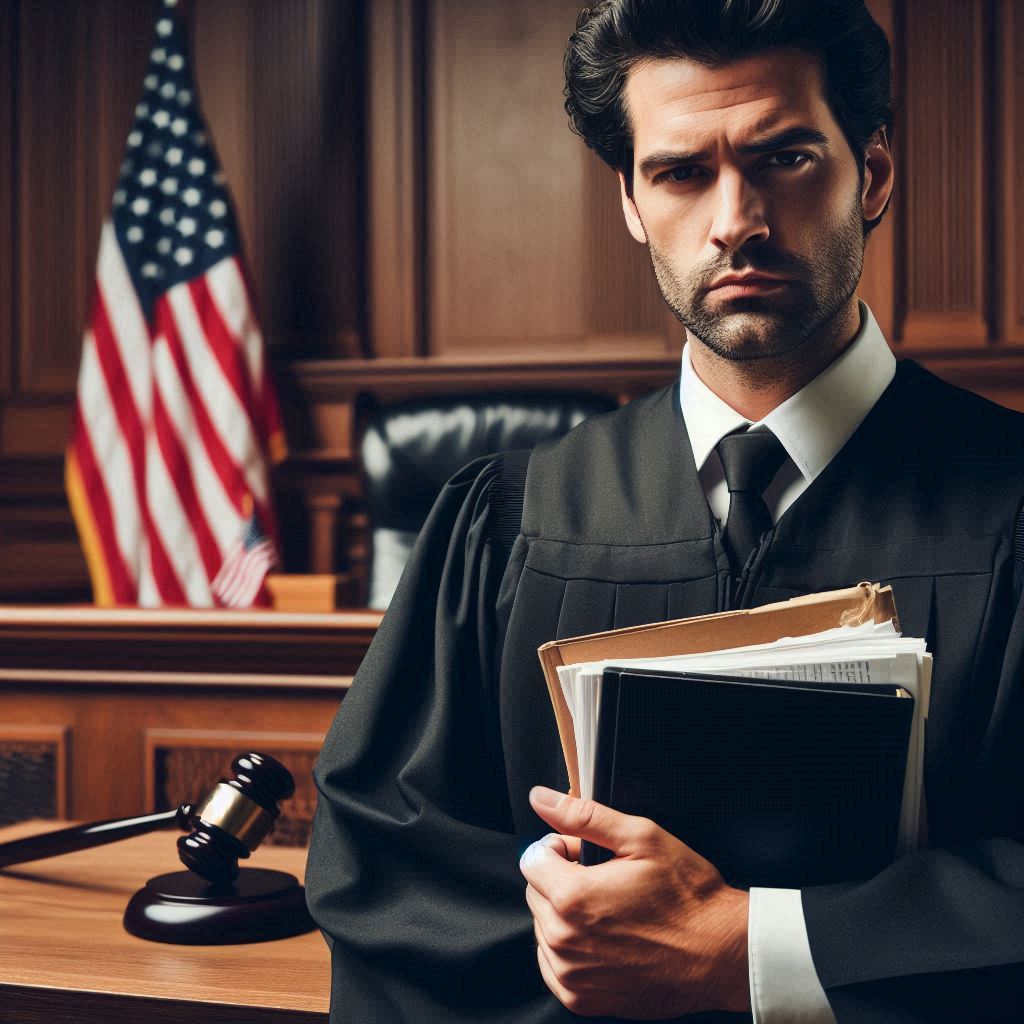Introduction
The role of a prosecutor in the justice system
A prosecutor is a legal professional responsible for representing the state or government in criminal cases for Prosecutors Job Misconceptions.
They initiate and conduct legal proceedings against individuals accused of committing crimes.
Mention the importance of prosecutors in the criminal justice process: Prosecutors play a pivotal role in upholding justice by ensuring that criminal laws are enforced and perpetrators are held accountable.
They serve as advocates for victims and the community, seeking to establish the guilt of the accused and secure appropriate punishments.
By fulfilling these duties, prosecutors contribute to maintaining public safety and preserving societal order.
They collaborate closely with law enforcement agencies to gather evidence, assess cases, and make informed decisions about charges.
Additionally, prosecutors may negotiate plea deals to expedite justice while considering the interests of all parties involved.
In essence, prosecutors serve as guardians of the legal system’s integrity, striving to achieve fair and impartial outcomes in every case they handle.
Their role extends beyond mere litigation to encompass the ethical pursuit of truth and justice.
This responsibility requires prosecutors to exercise sound judgment, adhere to legal principles, and uphold the rights of both victims and defendants.
Misconception: Prosecutors only care about winning cases
The ethical obligations of prosecutors to seek justice, not merely convictions
Prosecutors have a duty to seek justice, which transcends the goal of merely securing convictions.
Their primary role involves upholding the law, ensuring fairness, and protecting the rights of all parties involved.
They must adhere to ethical standards that emphasize integrity, impartiality, and justice.
Prosecutors should present evidence truthfully, respect defendants’ rights, and act in the community’s best interests.
Examples of prosecutors working to ensure fair trials and just outcomes for defendants
Numerous instances highlight prosecutors’ commitment to justice over winning.
For example, some prosecutors have dismissed cases due to insufficient evidence, even when it meant losing a potential conviction.
These actions reflect their responsibility to avoid wrongful convictions and uphold legal integrity.
In some cases, prosecutors have worked to exonerate wrongfully convicted individuals by reopening investigations and supporting DNA testing, ensuring justice prevails.
Additionally, prosecutors often engage in plea bargaining, not to expedite cases, but to achieve fair and reasonable outcomes.
Through plea deals, they balance the interests of justice, victims, and defendants, ensuring appropriate sentences that reflect the circumstances.
This approach demonstrates their dedication to fairness rather than merely winning trials.
Moreover, prosecutors actively participate in diversion programs that offer defendants alternatives to traditional sentencing.
These programs, such as drug courts or mental health courts, provide rehabilitation and support rather than punitive measures.
By advocating for these programs, prosecutors show their commitment to addressing the root causes of criminal behavior and promoting long-term solutions.
Prosecutors also have a responsibility to disclose exculpatory evidence, which can exonerate defendants.
This obligation ensures that all relevant information is available, contributing to a fair trial.
Upholding this duty reflects their dedication to transparency and justice, reinforcing the ethical principles that guide their work.
Furthermore, many prosecutors engage in community outreach and education, fostering trust and understanding between the legal system and the public.
By building relationships with communities, they demonstrate their commitment to serving and protecting the public, not just pursuing convictions.
These efforts underscore the multifaceted role of prosecutors in promoting justice, accountability, and public safety.
Read: Impact of High-Profile Cases on Prosecutors‘ Careers
Misconception: Prosecutors are solely focused on punishment
One common misconception about prosecutors is that they are solely focused on punishment.
In reality, prosecutors play a vital role in considering rehabilitation and alternative sentencing options for individuals involved in the criminal justice system.
Here’s a detailed explanation of the prosecutor’s role in promoting rehabilitation and reducing recidivism:
Role in Considering Rehabilitation and Alternative Sentencing Options
Prosecutors are not just concerned with putting people in jail; they also consider ways to address the underlying issues that may have led individuals to commit crimes in the first place.
This includes evaluating alternative sentencing options such as community service, probation, drug rehabilitation programs, or mental health treatment.
When prosecutors take a rehabilitative approach, they aim to help individuals address the root causes of their criminal behavior and prevent them from reoffending in the future.
By offering alternatives to traditional incarceration, prosecutors can help individuals make positive changes in their lives and reintegrate into society successfully.
Programs and Initiatives Aimed at Reducing Recidivism
Many prosecutors’ offices across the country have implemented programs and initiatives specifically designed to reduce recidivism and promote rehabilitation among offenders.
These programs often involve collaboration with community partners, social service agencies, and other stakeholders to provide comprehensive support to individuals in the criminal justice system.
- Diversion Programs: Prosecutors may divert certain low-level offenders away from the traditional criminal justice system and into programs that offer counseling, education, and job training opportunities.
- Drug and Mental Health Courts: These specialized courts provide individuals with substance abuse or mental health issues access to treatment programs as an alternative to incarceration.
- Restorative Justice Programs: These programs focus on repairing harm caused by the crime and promoting accountability through dialogues between victims, offenders, and the community.
- Reentry Programs: Prosecutors may work with reentry programs to assist individuals transitioning back into society after serving their sentences, providing support to help them avoid reoffending.
Overall, prosecutors today are increasingly recognizing the importance of rehabilitation and alternative sentencing options in addressing the complex factors that contribute to criminal behavior.
By incorporating these approaches into their practices, prosecutors can help break the cycle of crime and create safer, healthier communities for all.
Read: Prosecutor Salaries: What to Expect in This Career
Misconception: Prosecutors always believe the police
Many people believe that prosecutors always blindly trust the police in criminal cases.
However, the reality is quite different.
Prosecutors have a duty to evaluate evidence impartially and independently, regardless of its source.
Prosecutor’s Duty to Evaluate Evidence
Prosecutors are not supposed to simply accept the evidence presented to them by law enforcement at face value.
They are required to carefully review and assess all evidence in a case to determine its credibility and reliability.
This includes scrutinizing the police reports, witness statements, forensic evidence, and any other relevant information.
By maintaining an impartial stance, prosecutors ensure that justice is served and that the rights of the accused are protected.
They must weigh the strengths and weaknesses of the evidence presented to them before making a charging decision or proceeding to trial.
Challenging Police Conduct or Testimony
There have been numerous cases where prosecutors have challenged police conduct or testimony.
This can happen when there are inconsistencies in the evidence, questions about the veracity of witnesses, or concerns about the legality of police actions.
Prosecutors have a duty to uphold the law and seek justice, which sometimes means holding law enforcement accountable for any misconduct or errors.
By questioning police conduct or testimony, prosecutors ensure that the integrity of the criminal justice system is maintained.
In high-profile cases or those with significant public interest, prosecutors must be especially vigilant in evaluating the evidence presented by the police.
They must be willing to push back against any improper actions or statements made by law enforcement to prevent wrongful convictions or miscarriages of justice.
It is a misconception to assume that prosecutors always believe the police without question.
In reality, prosecutors have a crucial role in ensuring that the evidence in a case is thoroughly examined and that justice is served.
By upholding their duty to evaluate evidence independently and challenge police conduct when necessary, prosecutors play a vital role in upholding the integrity of the criminal justice system.
Read: The Role of Public Defenders in the Justice System

Misconception: Prosecutors do not prioritize victims’ rights
The prosecutor’s responsibility to advocate for victims and protect their interests
Prosecutors play a crucial role in advocating for victims and ensuring their rights are protected throughout the judicial process.
They must provide victims with the necessary information about their cases and keep them informed about court proceedings.
They also offer emotional support and ensure victims’ voices are heard in court.
By maintaining regular communication with victims, prosecutors help them navigate the often complex legal system.
This support is vital for victims who may feel overwhelmed or marginalized during criminal proceedings.
Prosecutors also work to ensure that victims receive appropriate restitution and compensation for their losses.
They advocate for restitution orders that require offenders to compensate victims for financial losses, medical expenses, and other damages.
This aspect of their role highlights the prosecutor’s commitment to addressing the harm suffered by victims and providing them with a sense of justice and closure.
Examples of victim-centered approaches taken by prosecutors in handling cases
Numerous prosecutors have adopted victim-centered approaches to ensure that victims’ needs and rights remain a priority.
For instance, specialized victim advocacy units within prosecutor offices provide dedicated support and resources to victims of crime.
These units work closely with victims from the initial reporting of the crime through the resolution of the case.
By offering counseling, safety planning, and other services, these units help victims feel supported and secure.
Additionally, many prosecutors utilize victim impact statements during sentencing.
These statements allow victims to express how the crime has affected their lives, giving the court a fuller understanding of the crime’s impact.
Prosecutors support victims in preparing and presenting these statements, ensuring their perspectives are considered during sentencing.
This practice underscores the importance of victims’ voices in the judicial process and helps achieve more balanced and fair outcomes.
Some prosecutors also employ restorative justice programs, which focus on repairing the harm caused by criminal behavior through facilitated dialogue between victims and offenders.
These programs prioritize victims’ needs for closure and accountability, offering an alternative to traditional punitive measures.
By participating in restorative justice, victims have the opportunity to directly address offenders, express their feelings, and seek answers, fostering healing and reconciliation.
Prosecutors often work with multidisciplinary teams to address the needs of victims comprehensively.
These teams may include social workers, counselors, and law enforcement officers who collaborate to provide holistic support.
This coordinated approach ensures that victims receive the necessary services and resources to recover from the crime’s impact.
It also demonstrates the prosecutor’s commitment to addressing all aspects of victims’ well-being.
Read: Role of Prosecutors in the Juvenile Justice System
Learn More: Navigating Corporate Litigation as In-House Counsel
Misconception: Prosecutors are immune from making mistakes
Many people believe that prosecutors are immune from making mistakes.
This misconception is far from the truth.
Prosecutors, like all humans, can make errors in judgment.
These errors can stem from various sources, such as misunderstandings of evidence, miscommunications, or even cognitive biases.
Recognizing that prosecutors are not infallible is crucial for understanding the complexities of the justice system.
Acknowledge That Prosecutors are Human and Can Make Errors in Judgment
Prosecutors work under immense pressure to secure convictions and uphold the law.
This environment can sometimes lead to mistakes, despite their best intentions.
Errors can occur during the investigation, charging decisions, or trial process.
It is essential to acknowledge that these mistakes can have serious consequences, including wrongful convictions.
Transform Your Career Today
Unlock a personalized career strategy that drives real results. Get tailored advice and a roadmap designed just for you.
Start NowMechanisms in Place to Address and Rectify Prosecutorial Errors, Such as Conviction Integrity Units
To address and rectify prosecutorial errors, several mechanisms are in place.
One of the most important is the establishment of Conviction Integrity Units (CIUs).
CIUs are dedicated teams within prosecutor’s offices that review and investigate claims of wrongful convictions.
Their primary goal is to ensure that justice is served, even if it means overturning a conviction secured by their office.
CIUs conduct thorough reviews of cases flagged for potential errors.
They reexamine evidence, witness testimonies, and legal procedures to identify any mistakes.
If new evidence or issues are found, CIUs work to correct the record and seek appropriate remedies.
This may involve recommending a new trial, vacating a conviction, or dismissing charges altogether.
Transparency and accountability are key components of CIUs.
Prosecutors must be willing to admit mistakes and take corrective action.
This openness fosters public trust in the justice system.
By addressing errors head-on, CIUs demonstrate a commitment to fairness and integrity.
In addition to CIUs, other safeguards exist to prevent and correct prosecutorial errors.
Appellate courts review trial court decisions and can overturn convictions if errors are found.
Defense attorneys play a crucial role in identifying and challenging prosecutorial mistakes.
Their advocacy ensures that defendants’ rights are protected throughout the legal process.
Continuing education and training for prosecutors also help mitigate errors.
By staying updated on legal developments and best practices, prosecutors can improve their decision-making skills.
Training programs often emphasize ethical responsibilities and the importance of impartiality in pursuing justice.
Public awareness and media scrutiny can also highlight prosecutorial errors.
High-profile cases of wrongful convictions often lead to reforms and changes in prosecutorial practices.
Society’s demand for accountability drives improvements in the justice system.
Misconception: Prosecutors do not consider the impact of their decisions
One common misconception about prosecutors is that they do not take into account the impact of their decisions on individuals, families, and communities.
However, this is far from the truth.
Prosecutors play a critical role in the criminal justice system and are tasked with making decisions that can have significant consequences for all involved.
Impact of Prosecutorial Decisions
- Prosecutorial decisions can have a lasting impact on the lives of individuals who are accused of crimes. These decisions can determine whether someone goes to jail or prison, faces fines, or is placed on probation.
- For families, the decisions made by prosecutors can also have a ripple effect. A parent’s incarceration, for example, can have a profound impact on their children and other family members.
- At the community level, prosecutorial decisions can affect public safety, trust in the justice system, and overall well-being. Aggressive prosecution of certain crimes may have unintended consequences on a community.
Efforts to engage with the community
- Many prosecutors are aware of the impact of their decisions and actively seek to engage with the community to promote transparency and accountability. They may hold town hall meetings, participate in community events, or create advisory boards.
- By engaging with the community, prosecutors can gain valuable insights into local needs and concerns. This can help them make more informed decisions that take into account the unique circumstances of the community they serve.
- Transparency and accountability are key principles that prosecutors strive to uphold. By being open about their decision-making processes and seeking feedback from the community, prosecutors can build trust and credibility.
All in all, prosecutors do consider the impact of their decisions on individuals, families, and communities. By engaging with the community and promoting transparency and accountability, prosecutors can make more informed decisions that serve the interests of justice.
Conclusion
Throughout this blog post, we have addressed common misconceptions about the prosecutor’s job.
We explored the misconception that prosecutors only care about winning cases, highlighting their ethical obligations to seek justice and ensure fair trials.
We discussed how prosecutors prioritize victims’ rights, demonstrating their commitment to advocating for and protecting victims throughout the judicial process.
Additionally, we examined how prosecutors often work beyond the courtroom, engaging in community outreach and education to build trust and foster understanding.
The importance of dispelling misconceptions about prosecutors and understanding the complexities of their role in the criminal justice system
Dispelling misconceptions about prosecutors is crucial for a more accurate and comprehensive understanding of their role.
Misunderstandings can undermine public trust in the criminal justice system and diminish appreciation for the work prosecutors do.
Recognizing the ethical standards and responsibilities prosecutors uphold helps the public see their dedication to justice, fairness, and the protection of victims’ rights.
Prosecutors operate within a complex legal framework, balancing multiple interests and navigating ethical dilemmas to achieve just outcomes.
Their role involves not only prosecuting crimes but also ensuring that the legal process is fair, transparent, and respectful of defendants’ rights.
By understanding these complexities, the public can appreciate the prosecutorial role’s nuances and the diligence required to maintain legal integrity.
[E-Books for Sale]
The Big Book of 500 High-Paying Jobs in America: Unlock Your Earning Potential
$19.99 • 500 High-Paying Jobs • 330 pages
Explore 500 high-paying jobs in America and learn how to boost your career, earn more, and achieve success!
See All 500 High-Paying Jobs of this E-Book
1001 Professions Without a Degree: High-Paying American Jobs You Can Start Now
$19.99 • 1001 Professions Without a Degree • 174 pages
Discover 1001 high-paying jobs without a degree! Unlock career tips, skills, and success strategies for just $19.99!




